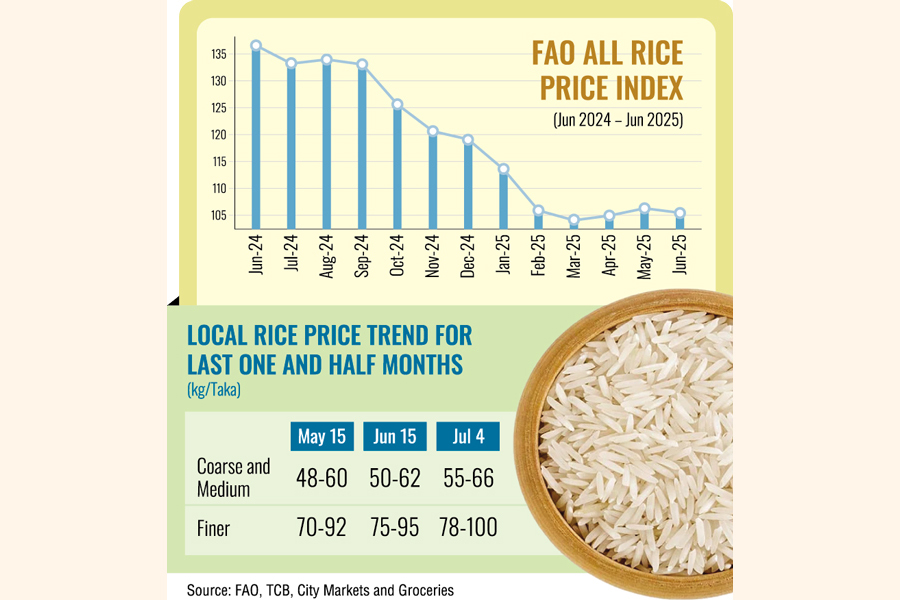Rice prices up at home despite global fall, hurting low-income people

Published :
Updated :

Prices of rice are increasing in local markets despite a decline in the global market, causing hardship for lower-income groups in Bangladesh.
Global rice prices fell in June, as shown in the UN Food and Agriculture Organization's (FAO) latest monthly report. The FAO All Rice Price Index dropped to 105.5 points in June 2025-down by 0.8 per cent from May and 22.8 per cent lower than a year ago.
The drop was mainly due to a fall in prices of Indica rice, a variety commonly consumed in South Asia. Trade in Asian Indica markets remained slow in June due to low buying interest and a rise in freight costs. Even though India sold some rice to African countries and Pakistan had limited stock, prices still fell in most regions-especially in Vietnam, where prices dropped to the lowest since January 2022.
Export prices in major markets (parboiled suitable for Bangladesh) ranged from US $ 364 to $400 a tonne in India, Pakistan, and Vietnam, while in Thailand, prices stood at $430 to $452 a tonne-a decline of 1.0 to 4.0 per cent in Asia.
However, this declining trend is missing in Bangladesh. Local rice prices rose by 6.0 to 8.0 per cent in June, even though the country just finished harvesting its biggest crop-Boro.
After staying stable for about one and a half months, the prices of coarse, medium, and fine rice varieties rose again, putting more pressure on low-income consumers.
Coarse rice is now selling at Tk 55-56 a kg, medium quality at Tk 64-65, and finer at Tk 78-100 a kg-an increase of Tk 5.0-7.0 a kg in a month.
Helal Uddin, a grocer at Zakir Hossain Road in Mohammadpur, said rice prices started going up from mid-June. "Each 50-kg sack has become Tk 250-300 costlier," he noted.
Another trader at Mohammadpur Krishi Market said millers are blaming the price hike on increased paddy prices-by Tk 200-300 per maund in June-July compared to May.
Asnowar Hossain Babul, a rice wholesaler from Nilphamari, said millers first raised rice prices, which later pushed up paddy prices.
He claimed that millers now hold a large stock of paddy, while some farmers are also benefiting from the price rise who harvests the crop lately.
Farm economist Prof Golam Hafeez Kennedy said the price hike in such a higher rate is "illogical," especially as Bangladesh imported 1.25 million tonnes of rice, public procurement is running well and domestic production is also showing good sign.
He urged the government to closely monitor prices at mills and wholesale markets to ensure affordability for the poor.
Md Moniruzzaman, Director of the Directorate General of Food (DGoF), said public food warehouses currently have 1.7 million tonnes of rice-around 20 per cent more than last year.
He said that 0.75 million tonnes were imported by the government in the last fiscal year, and another 1.1 million tonnes were bought under the recent Boro procurement programme.
Meanwhile, the Department of Agricultural Extension (DAE) expects a record 22 million tonnes of Boro rice production this year.
tonmoy.wardad@gmail.com


 For all latest news, follow The Financial Express Google News channel.
For all latest news, follow The Financial Express Google News channel.